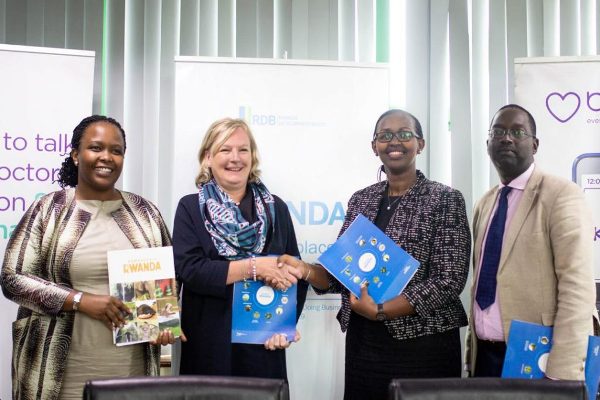
Kigali: The Government of Rwanda and Babylon Health (operating as Babyl in Rwanda) have entered into a 10-year partnership to enable Rwandans countrywide to access quality healthcare services through their mobile phones.
Through the partnership, Babyl will work with the Ministry of Health to develop a new healthcare delivery model called ‘Digital-First Integrated Care’, for convenient access to qualified doctors and nurses, especially for people living in remote areas.
The USSD (Unstructured Supplementary Service Data)platform will work as follows: –
• A patient registers on the platform
• The patient will then be able to book an appointment
• A medical practitioner will then call them back and take them through a triage process that is further enhanced with the world’s leading AI Triage and Symptom checker platform
• Lab testsresults will also be shared through the platform as soon as the patient has taken them to the medical institution
• Prescriptionswill also be delivered via SMS for patients to buy medication from pharmacies across Rwanda.
Holders of RSSB (Rwanda Social Security Board) and Community-Based Health Insurance (Mutuelle de Sante) schemes will have access to the service and for efficiency, the patients will be able to process their co-pay payments easily using mobile money.
Over time, Babyl’s digital platform will compile Electronic Medical Records (EMRs) of a large proportion of the Rwandan population.
Furthermore, EMRs will enable more coordinated care for patients through efficient digital referrals and patient information transfer. Patients will have more control over their own health, faster treatment and less trips to health facilities.
Speaking after the signing at the RDB (Rwanda Development Board) head office, Dr. Daniel Ngamije, the Minister of Health said: “We are delighted to have this partnership with Babyl who will work alongside all our health institutions and RSSB to deliver this innovative digital healthcare service. Increasing access to our doctors will help stop self-diagnosis and self-medication which lead to longer term complications. With the reduced burden on health centres and other medical institutions, our medical professionals will also now spend more time and resources on serious medical cases, further increasing the quality of healthcare delivery across the country.”
Clare Akamanzi, the RDB Chief Executive Officer said: “Babyl’s investment in Rwanda contributes to Rwanda’s National Strategy for Transformation, particularlyensuring access to quality healthcare for all, and establishing Rwanda as a globally competitive knowledge-based economy through such partnerships that build skills with practical digital applications in health.”
Tracey McNeill, Vice President of Global Clinical Governance at Babylon Health said: “Babylon Health was founded in the United Kingdom with a single purpose: To put an accessible and affordable health service in the hands of every person on earth. Rwanda was our first choice in our global strategy due to its enabling environmentfor investors with regard to regulations and infrastructure favourable for tech businesses. We support the Government’s vision of using technology and innovation to drive economic growth, support human development, and advance key sectors including healthcare.”
Dr. Solange Hakiba, the Deputy Director General of RSSB said: “RSSB thrives to increasingly deliver a comprehensive social security package that addresses all social security needs of all Rwandans. Digital healthcare is a significant step towards ensuring that all our members can conveniently access doctors without fear of loss of income or worry about travel to a medical institution. Early intervention with eased access to healthcare will also reduce the burden on our universal healthcare scheme.”
Shivon Byamukama, the Managing Director of Babyl Rwanda said: “The country’s forward-thinking vision is demonstrated by the palpable desire and emphasis on embracing innovation and partnershipsin acting as a proof of concept country. In the short time that we have been operating, we have already amassed over 2 million registered users and delivered over 1 million consultations with doctors and nurses. Rwandans are reacting positively to health care innovation and embracing health seeking behaviours as patients do not have to spend time travelling or experience income loss when seeking care.” . (End)
